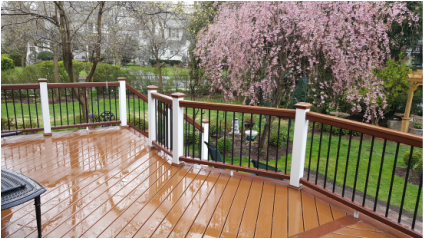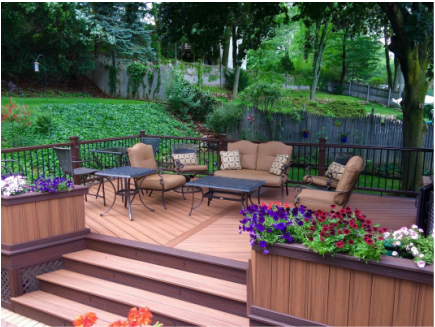 As custom deck builders in NJ, Decks by Ziec strives to give customers complete and accurate information about our products. This helps them make an informed decision before they purchase any of our decks and it strengthens our reputation as a conscientious company. Doing this also ensures that customers make decisions that are in their best interests. One area that often confuses customers who are considering buying one of our products for the first time is deck composition material. Specifically, many want to know the differences between wood and composite decks and which they should choose. Wood Decks The first selling point of using wood as decking material is that is generally looks more natural than other materials. A second selling point is that wood decking is less expensive than composite decking. (This is in the short time and without factoring in maintenance costs.) Three types of wood are commonly used for decking material: Southern Pine, Cedar and mahogany. Southern Pine - although inexpensive and easily available - is subject to warping and requires high maintenance. Cedar is heavily favored because it is relatively resistant to rotting. Additionally, many customers choose it because of its wonderful smell. However, a main disadvantage it and other woods have over composite decking is that they are generally more difficult to maintain. Most wood decking needs to be sealed and stained regularly. One method of determining when staining may be necessary is to sprinkle water on your wood deck. If the water is absorbed then staining is necessary; if not then it can probably be put off. Finally, Mahogany - a higher grade of wood - is generally more expensive than either Southern Pine or Cedar. The advantage to it is that it is very durable, ages well and requires relatively less maintenance. Composite Decks Composite decking – which is usually composed of plastic, such as polyethylene and/or polyvinyl chloride, and wood particles - is usually more expensive than wood decking. On the other hand, composite decking requires less maintenance than wood decks. Also, composite decking is less susceptible to rotting, splintering or twisting. Generally, pressure washing with detergent is all that is required to rid the surface of superficial debris. Some other advantages composite decking has over wood decking are that it is splinter and slip resistant making it safer for children and there is a wider color selection available for it. Lastly, the long term costs are lower due to less maintenance being needed for composite decks. Finally, the decision on which to choose is ultimately a personal one. There are advantages and disadvantages to wood and composite decking for homeowners. Our Custom deck contractors in Cranbury NJ strive to accommodate customers regardless of their personal preferences in deck design and/or construction material. We believe that a well informed customer is bound to be a satisfied one as well.  For many summers your deck has held barbecues attended by you and your friends and family. For several times during the fall you’ve watched as the multicolored leaves drifted slowly onto your deck and waited for the snows of winter. During winter you’ve adorned it with lights and ornaments. In springtime you and your family finally came out onto it to begin another season of outdoor gatherings. For years, in general, it has been a place for you to gather as it has served as a source of pride and envy by others. But now your deck is getting a little long in the tooth. It isn’t looking as sturdy as it did before and understandably you are becoming more than a little concerned with the safety of your family and the value of your home. Here are some signs that it may be time to replace your wood deck. Age: How old is your deck? If it is more than 7 years old it probably needs an inspection at the very least and replacement at most. Time, weather and exposure to the elements can all conspire to age your deck forcing you to make the decision on whether to have it repaired or replaced. Our team at Decks by Ziec handles deck repair in NJ. Check the railing: Often when people gather on decks they tend to lean on the railing. This loosens the railing over time and can lead to serious injury if not repaired or replaced. If only the railing is showing signs of weakness then it may be possible to have it replaced and not the entire deck. Rotting posts: Check the base of your deck’s posts. If there is rotting present in one or two post then it may be possible to forgo replacing the entire deck. If there is significant rotting present in all posts then it may be time to replace the entire deck. We are custom deck builders in NJ who can replace your deck with a wood or composite deck. Loose Joists: Joists – which hold the deck up – should be checked for rotting. Typically water can work its way into the joists below the deck. This is a sign that it may be time for a new deck. Inspect the deck’s surface: If only a few planks are damaged then repair may be all that is needed. If, on the other hand, multiple planks are warped, cracked or twisted then replacement may be the best option. Loose Ledger boards: The ledger board attaches the deck to your home. If it begins pulling away from your home then it may be time for a new deck. Finally, the best way to determine whether your deck needs to be repaired or replaced is to have an inspection done of the entire structure. Decks by Ziec can repair, replace, restore and refinish your deck ensuring that you will have a safe, pleasant place to gather all year round. |
CategoriesArchives
June 2019
|
 RSS Feed
RSS Feed